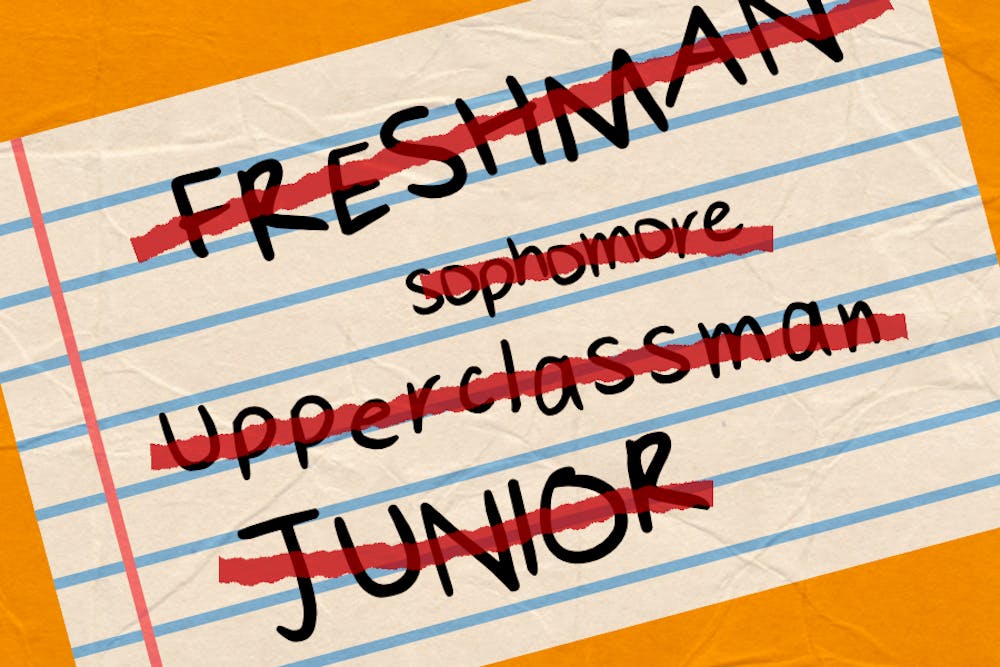
There is a quiet movement brewing at other Pennsylvania universities. First Penn State. Now Drexel. Is Penn next?
This movement is how students label themselves. Rather than using the terms “freshman," “sophomore," “junior” and “senior," these schools are moving toward a more inclusive, flexible labeling system. For example, instead of “junior," they would use the more informative term “third year." Rather than use the terms “upperclassmen” and “underclassmen," which both reek of male-centric hierarchy, Penn State has elected to use the terms “upper division” and “lower division” students.
When were these colloquial terms created?
In the 1600s, these labels were coined at the University of Cambridge to categorize students. “Freshman” was used as a term for “newbies” (another term that I have qualms with). The meaning of “sophomore” can be broken down into “a wise fool." “Junior” and “Senior” were used to delineate upper division students, which exudes a father-son naming convention. It is ironic that the United Kingdom no longer uses these terms (they use the labels “first year," "second year," and "final year"), yet it's the former American colonies that are reluctant to give them up.
You may be thinking, it does not matter how we label ourselves. Many college students in Pennsylvania don’t seem to care about the label change. Some may assert that how we label ourselves has a negligible impact on our day-to-day lives.
Although I concede that changing class year labels would largely be a performative gesture, I believe that the words we use to describe ourselves matter.
Rigid labels can hold us back, whereas flexible labels may help us overcome stress. One study found that students who attributed personality as changeable (both for themselves and for others) turned out to be less stressed in social exclusion situations compared to students who used fixed labels.
We tend to use labels to lighten our cognitive load. Some people are uncomfortable with ambiguity, so fixed labels help simplify a complex world. However, I also value inclusivity and flexibility, and I believe that Penn should adopt a similar flexible labeling system as Drexel and Penn State.
The system would make it especially inclusive of students who are on unique academic journeys, whether they are graduating in three years or spending an extra academic year sub-matriculating into a graduate degree program.
This communication change would not be new for us. The Penn community recently revised the term “freshman” to “first year," so why not expand it?
In a request for comment, Penn University Life responded that “The University does not have an official policy on the terms used to refer to class years. We are beginning to introduce more neutral, inclusive, and contemporary language for class years that will be reflected in institutional programs and initiatives - for example, the new Second-Year Experience program.”
If we want to be more neutral and inclusive, then let’s experiment with using different terms to describe ourselves, such as third-year, fourth-year and upper/lower-level students. Of course, it is up to the student community on if this cultural change will catch on or not.
While being declared a “fourth year” on Hey Day has a different sound than being called a “senior,” I think it can be normalized if a majority of students adopt this change. The symbolism of becoming leaders of the school does not need a “senior” label attached to it.
This change in labeling also reminds me of how communities are beginning to embrace the singular pronoun “they.” Both Penn students and academic departments have increasingly and consciously practiced this cultural norm of asking for pronouns in people’s introductions.
Once I arrived at Penn in 2018, I recognized that students don’t use the word “grade” to refer to their academic standing like I did in high school. They use the term “class year" or "year," so I quickly complied with the social norm. These two examples demonstrate that the Penn community is flexible enough to redefine class year labels.
However, inclusion will not be achieved by this single symbolic revision. Although Penn sends messages of diversity and inclusion, this change in how we label ourselves would be just one small step in creating a more inclusive community.
It is time for us to rethink our labels, and the change does not have to start administratively. We all have the power to choose the words we communicate with others.
Now it is up to you. What year are you?
JADEN CLOOBECK is a College fourth-year studying psychology from Laguna Beach, Calif. His email address is jaden@sas.upenn.edu.
The Daily Pennsylvanian is an independent, student-run newspaper. Please consider making a donation to support the coverage that shapes the University. Your generosity ensures a future of strong journalism at Penn.
Donate






